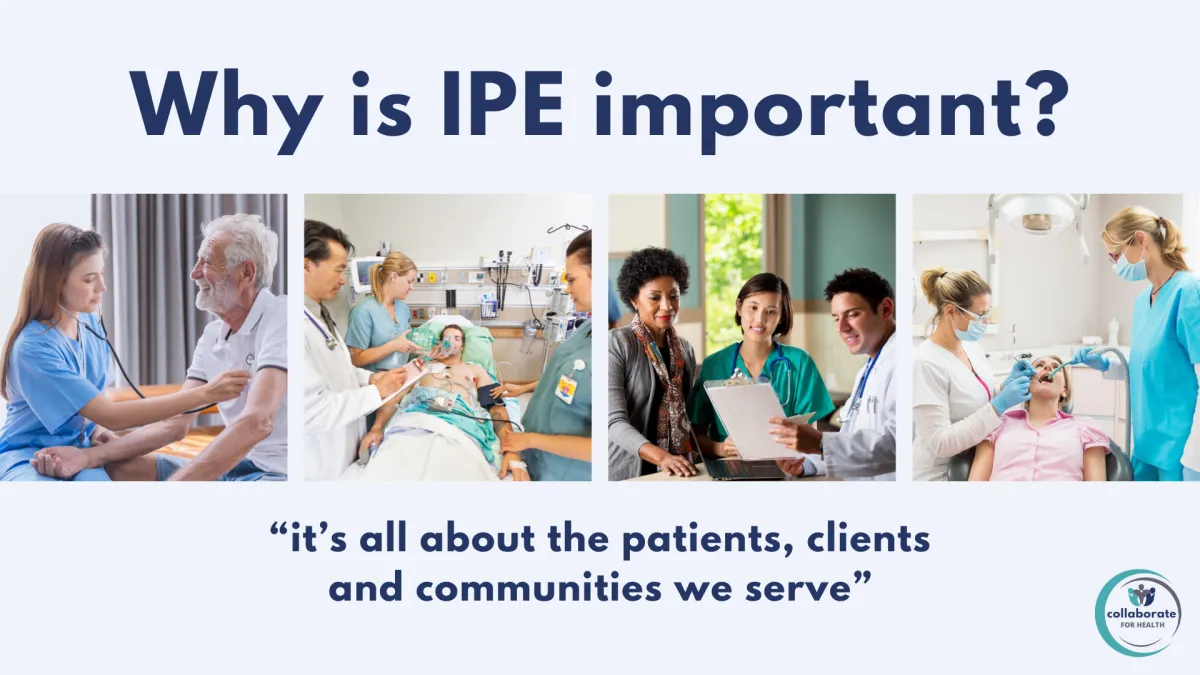BLOG
Welcome to Collaborate for Health, where we champion the power of collaboration to transform healthcare. Explore our collection of insightful articles and blogs, crafted to illuminate the benefits of teamwork in healthcare. From enhancing patient outcomes to streamlining administrative processes, our content is rich with valuable insights. Dive into a wealth of knowledge designed to inspire and inform. Take a moment to explore our website and unlock the potential of collaboration for a healthier future. Read the latest articles covering a variety of topics and perspectives on interprofessional education, interprofessional collaboration, patient advocacy, teamwork and collaboration skills. We are BETTER TOGETHER!
ADVANCING INTERPROFESSIONAL COLLABORATIVE PRACTICE
Want to contribute? Have questions or comments about article topics or content?
Please contact us via email.

Why is Interprofessional Education Important?
Interprofessional Education (IPE) is a transformative training approach, bringing together learners from diverse professions to collaboratively learn about, from, and with each other. If you are interested in learning more about what IPE is and what IPE is not, please refer to a previous blog, where I discuss this IPE information in detail.
Development of interprofessional education (IPE) in the United States
Evidence-based interventions are usually developed through theories, frameworks or models. In addition to these resources, educators should utilize the Interprofessional Education Collaborative (IPEC) core competencies as a guiding framework to develop interprofessional education learning experiences. The framework includes one overarching domain (interprofessional collaboration) and four competencies (values and ethics, roles & responsibilities, communication, and teams & teamwork). There are 33 related sub-competencies.

"In the United States and increasingly throughout the world, the IPEC competencies have emerged as one of the most valuable and widely utilized educational resources to prepare learners for interprofessional teamwork." (IPEC, 2023)
While researchers are continuing to strengthen the IPE research, there is sufficient evidence to support the outcomes of IPE. The benefits of interprofessional education include
increased knowledge of professional roles
improved IPE perceptions
improved collaborative practice skills
minimized negative professional stereotypes of other professions
Why is interprofessional education (IPE) important?
According to the World Health Organization (WHO), IPE is a required step to prepare the health workforce to meet the needs of the communities they serve. IPE is not only for traditional students enrolled in an educational institution. IPE serves as an opportunity for health professionals and providers to continuously learn how to best collaborate as a team. Similar to any evidence-based practice tool, IPE supports improved healthcare delivery and patient outcomes. Taking it a step beyond a single patient or client encounter, IPE can be integrated to to achieve the Quintuple Aim.
Many of the conversations surrounding IPE occurs within academic institutions that have health professional programs. However, there is research informing us of the benefits of early IPE exposure with pre-health learners. Students interested in seeking a health career have varying levels of stererotypes about health professions. IPE can help mitigate the negative stereotypes and foster a positive change in IPE perceptions.
The reason most IPE discussions occur at the college and university level is because 25 education accreditors require IPE within the curriculum. The Health Professions Accreditors Collaborative (HPAC) is a collective group representing these 25 organizations and provides collective guidance on developing quality IPE experiences focused on preparing students for collaborative practice post-graduation. IPE provides that opportunity to develop an interprofessional identity so the team is ready to collaboratively practice. Interprofessional collaborative practice is associated with improved patient outcomes, improved community health, reduced medical costs, and decreased employee burnout. IPE is an evidence-based tool in your toolbox to strengthen our health systems.

"Endorsing HPAC members recognize that accreditation must play an important role promoting quality IPE that leads to effective health outcomes, including encouraging communication and collaboration across professions and the institutions that sponsor educational programs." (HPAC, 2019)
As we continue to explore the benefits of interprofessional education, we need to engage the learners post-experience (1 week, 1 month, 3 months, etc.) and gather their feedback on how they have strengthened their interprofessional collaborative practice. IPE can be transformative having far-reaching effects on the healthcare landscape and overall well-being for all team members.
To continue to learn more about interprofessional education, visit me on Linkedin or browse my website collaborateforhealth.com.
References:
Interprofessional Education Collaborative. (2023). IPEC Core Competencies for Interprofessional Collaborative Practice: Version 3. Washington, DC: Interprofessional Education Collaborative.
Health Professions Accreditors Collaborative. (2019). Guidance on developing quality interprofessional education for the health professions. Chicago, IL: Health Professions Accreditors Collaborative.
ADVANCING INTERPROFESSIONAL
COLLABORATIVE PRACTICE
Want to contribute to sharing information? Have questions or comments about article topics or content?
Please contact us via email.

Transforming Healthcare Teams:
Building a Collaborative-Practice Ready Workforce
written by Tina Patel Gunaldo, PhD, DPT, MHS
In the ever-evolving landscape of healthcare, the traditional solo approach to education is fading away, making room for a more dynamic and collaborative future. Many health professional programs, a total of twenty-five, now mandate the integration of Interprofessional Education (IPE) into coursework, signaling a shift towards a workforce that is not only skilled in their respective fields but also adept at collaborative practice.
The World Health Organization (WHO) outlines three fundamental principles associated with IPE that serve as the foundation for preparing a "collaborative practice-ready" health workforce. This entails students from various professions learning not just from their coursework but from each other, fostering effective collaboration to enhance health outcomes. This approach becomes a crucial step in responding to local health needs and producing health workers competent and ready for interprofessional teamwork.
While integrating IPE into an already demanding curriculum presents challenges, the promise of collaborative practice cannot be overstated. The benefits extend beyond improved health outcomes to positively impact health professional job satisfaction, reduce burnout, enhance the patient experience, lower long-term health costs, and contribute to achieving the Quintuple Aim.
The healthcare industry has recognized the importance of teamwork in improving both individual health outcomes and population health measures. The National Academy of Sciences, back in 2003, urged the educational system to prepare health professionals for collaborative work, a call that gained further momentum with the support of the Centers for Medicare and Medicaid Services for collaborative models such as Accountable Care Organizations and Community Health Centers/Federally Qualified Health Centers. In 2011, the Interprofessional Education Collaborative Panel was established, providing guidance on behavioral expectations associated with interprofessional collaborative practice.
The realization that IPE is a lifelong learning topic, akin to ethics, cultural competence, and clinical skills, underscores the need for clinical and community-practice environments to offer ongoing IPE opportunities for providers. Countries like the United Kingdom, Australia, and Canada lead by example, demonstrating their commitment to interprofessional collaborative practices by employing personnel within clinical environments specialized in this area of practice. Embrace the transformative power of collaborative practice and explore how it can revolutionize the way healthcare teams function and deliver care for a brighter, healthier future.

2023-2024 Collaborate for Health. All Rights Reserved
